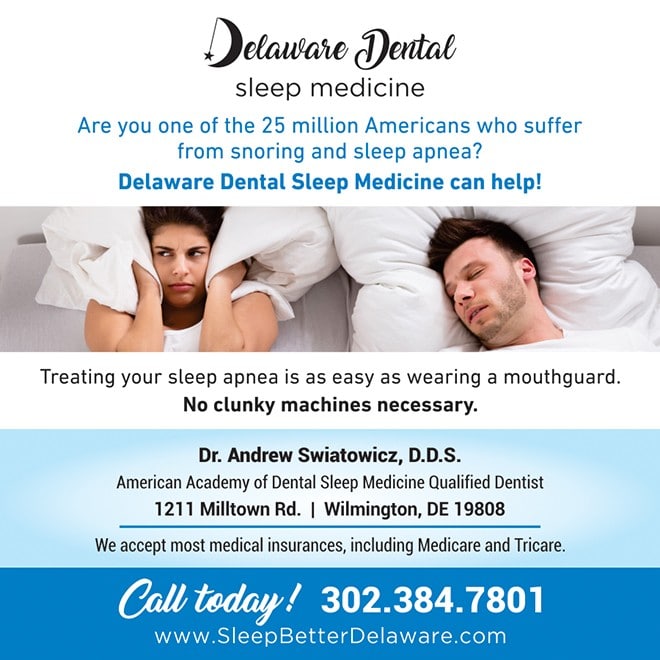Why Aren’t Women Being Diagnosed with This Deadly Disease?

By Andrew Swiatowicz, D.D.S
A specific type of patient comes to mind when we think of sleep apnea: an obese man. The problem with that image is that it causes us — and our doctors! — to pretend that women can’t suffer from sleep apnea. They can and they do.
Here’s what you need to know about sleep apnea and women.
What is Sleep Apnea?
Obstructive sleep apnea (OSA) is a chronic, terminal disease. It occurs when a person’s airway is physically blocked, which prevents them from breathing while they sleep.
Who gets sleep apnea?
OSA is usually thought to affect just men. In fact, some screening tools make “maleness” a risk factor prompting further testing. It’s true that men are often diagnosed with OSA at higher rates than women — but that could have more to do with gender bias. It is estimated that for every woman, three men are diagnosed with OSA. However, research suggests that OSA is more common in women than initially believed.
Sleep apnea looks very different in women.
One of the reasons for this under-diagnosis may be that the symptoms are different in women. Men complain of sleepiness, and are told that they snore or stop breathing. Women are less likely to have the same complaints. Instead, they might mention fatigue, morning headaches, insomnia, restless legs, and mood disorders. When a man shares his symptoms with his doctor, they suspect OSA. When a woman discusses her symptoms, her doctor might suspect anemia, fibromyalgia, hypothyroidism, or depression.
Women are typically under-diagnosed.
Up to 90 percent of women with OSA go undiagnosed. Some of that discrepancy might have to do with a medical practitioner’s bias, but some of it is likely owed to testing methods. A sleep test measures the amount of hypopneas (decreased breathing) and apneas (no breathing) to get a diagnosis for OSA. Women tend to have more Respiratory Event Related Arousals (RERA). RERAs occur when a patient wakes up because of an increased difficulty in breathing. Because they are sometimes ignored on a sleep test, female patients are told they do not have a breathing problem while sleeping.
Researchers are now suggesting that the diagnosis of OSA in women be based on different criteria.
The health effects are usually worse in women.
The effects of RERAs are just as harmful as those of apneas and hypopneas, even if not picked up on testing. In fact, women have more severe health complications from their type of sleep breathing disorders. Some of the major health issues with OSA are hypertension, heart attack, and stroke. Females with OSA are more likely to have diabetes, and hypothyroidism. Even more shocking, women are shown to have about 2.5 times the risk of death from OSA than men do.
Risk factors in women
Pregnancy is a risk factor: 20 percent of women in their third trimesters have OSA. Besides the normal health risks, pregnant patients have higher risks of pre-eclampsia, and eclampsia. Infants of apneic mothers have low birth weight, premature birth, and higher admittance rates to NICUs. Menopause also increases the risk for OSA in women, doubling the likelihood that they get the disease.
It’s not all bad news though!
Some things about being a woman actually help when it comes to OSA. Women’s shorter airways are less likely to collapse during sleep. The muscles of the tongue are more responsive at night, making it less likely to block the airway. And progesterone actually stimulates breathing while asleep, helping to keep the airway open. After menopause, hormone replacement therapy has been shown to bring OSA risks down to the level of pre-menopausal women.
Sleep apnea is a serious medical condition regardless of your gender. Women patients have to be especially vigilant to make sure they get the diagnosis and treatment needed to manage OSA. Talking to a dentist who understands sleep can be your best bet for getting healthier and sleeping better. For more information or to schedule a consultation, call 302-384-7801 or visit www.SleepBetterDelaware.com
Bio
Dr. Swiatowicz is a Diplomate of the American Board of Dental Sleep Medicine. His practice focuses on the treatment of sleep disordered breathing and craniofacial pain in children and adults. He works closely with a team of healthcare professionals to get you breathing and sleeping better.
Testimonials
“I have more energy now and I’m sleeping much better-Thank you!!” ~ A. McCloskey
“This office is very knowledgeable and efficient!” ~ L. Showell


